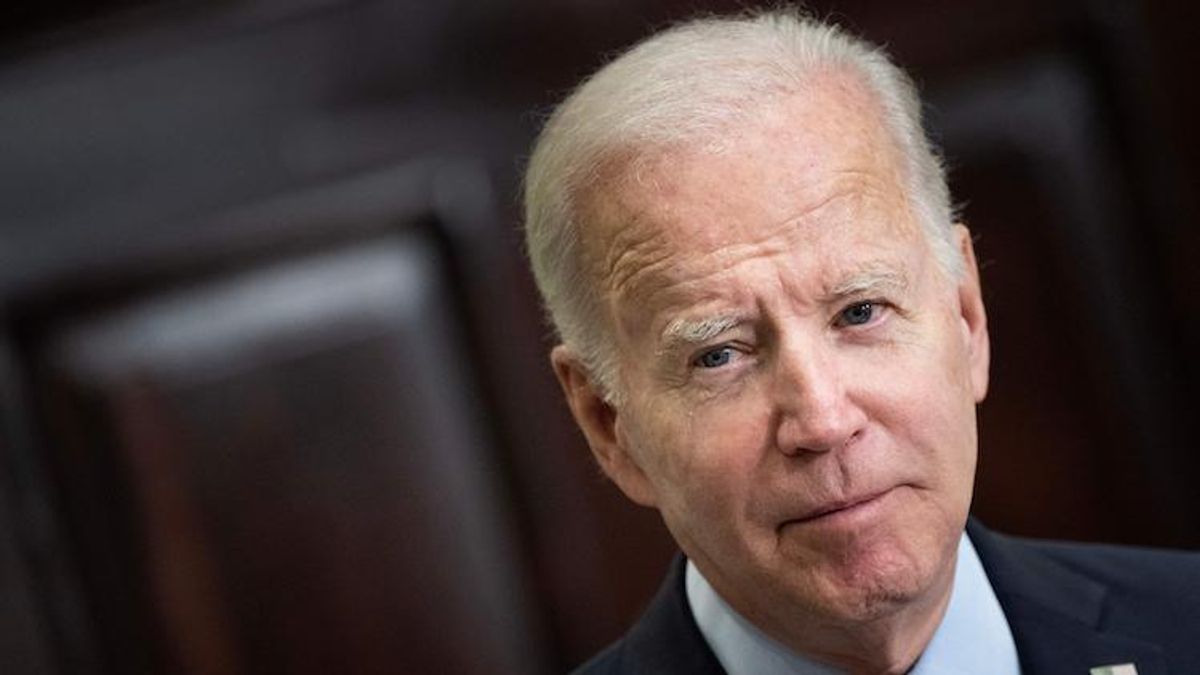(CNN) -- One Sunday morning in May of 2012, Vice President Joe Biden shocked the country with an unexpected declaration delivered in an interview on NBC's Meet the Press: He came out in public support of same-sex marriage for the first time.
"I am absolutely comfortable with the fact that men marrying men, women marrying women, and heterosexual men and women marrying another are entitled to the same exact rights, all the civil rights, all the civil liberties," Biden said when asked whether he was comfortable with same-sex marriage.
Those words -- which Biden insisted in subsequent years were unplanned -- marked a stunning personal evolution for the longtime creature of Washington, who as senator had voted to block federal recognition of same-sex marriages and previously insisted that marriage should only take place between a man and a woman. The interview would also turn out to be a watershed moment in modern American politics, prompting then-President Barack Obama to stake out the same position several days later and giving permission to other national leaders to also follow suit.
This week, a little more than 10 years after that famous TV moment, Biden is marking another important milestone as a staunch protector of LGBTQ rights. Now halfway through his first-term as president, Biden will sign into law on Tuesday a bill passed last week by Congress that mandates federal recognition for same-sex and interracial marriages.
The White House is planning to mark the occasion with a ceremony built to a scale that it believes is fitting of the moment, with one official saying in the days leading up to Tuesday that it was planning to simply "go all out."
Among the guests invited to the bill signing at the White House are prominent members of the LGBTQ community and activists. They include, according to a White House official, Judy Kasen-Windsor, widow of gay rights activist Edie Windsor; Matthew Haynes, co-owner of Club Q, the LGBTQ club in Colorado Springs where a gunman last month killed five people in a mass shooting; Club Q shooting survivors James Slaugh and Michael Anderson; and a number of plaintiffs from cases that culminated in the landmark civil rights case Obergefell vs. Hodges, in which the Supreme Court ruled in 2015 that same-sex couples can marry nationwide.
Officials also said that Biden's 2012 Meet the Press answer -- and the cultural transformation that it helped usher in surrounding the national conversation about same-sex marriage -- was expected to be a prominent theme of Tuesday's bill-signing event. Biden planned to invoke and quote directly from those comments in his remarks, a White House official told CNN.
"That single interview was a transformative moment in Biden's development as a politician. In the Senate, as a presidential candidate and as vice president, he always had been very cautious around LGBT issues, afraid of taking any position that opponents could use to portray him as a left-winger," Sasha Issenberg, author of "The Engagement: America's Quarter-Century Struggle Over Same-Sex Marriage," told CNN. "But the reception to what he said on Meet the Press was universal praise within his party, especially from LGBT advocates and donors who had previously been skeptical of him."
Basking in the hero-treatment from liberal activists, Biden would go on to aggressively associate himself with LGBT causes in the years to come, and has in particularly been "unusually bold" when it comes to transgender rights, Issenberg said.
The passage of the same-sex marriage legislation in Congress last week also marked a capstone to a year that produced a notable number of bipartisan packages. The bill passed in the House with 39 Republicans joining Democrats in support, after getting through the Senate with 12 Republican senators.
Such a bill had seemed improbable for many in Washington not that long ago, even as public opinion on same-sex marriage has continued to shift over the years: 68% of Americans supported same-sex marriage in 2021, up 14 percentage points from 2014, according to surveys from the nonprofit, nonpartisan Public Religious Research Institute.
But the public rallying and push to pass federal protections for same-sex and interracial marriage intensified this year after the Supreme Court overturned Roe v. Wade, sparking fresh fears that the nation's highest court would also reconsider other existing rights around marriage equality.
The day the Supreme Court's landmark ruling was issued in June, Biden warned that Justice Clarence Thomas "explicitly called to reconsider the right of marriage equality, the right of couples to make their choices on contraception. This is an extreme and dangerous path the Court is now taking us on."
He would go on to give similar warnings on the campaign trail leading up to the midterms: "We want to make it clear: It's not just about Roe and choice. It's about -- it's about marriage -- same-sex marriage. It's about contraception. It's about a whole range of things that are on the docket," he said at a Democratic National Committee reception in August.
Philanthropist and Democratic donor David Bohnett, who has been an outspoken gay- and transgender-rights activist and longtime supporter of Biden, told CNN that Tuesday's bill signing could not come at a more crucial moment.
"[Biden] has demonstrated his support for decades for lesbian and gay civil rights, and Tuesday's signing into law is a reaffirmation of that during this time when rights are under assault," Bohnett said. "I think we're here in response to the hateful and discriminatory actions and tactics by so many in the right-wing and so many that want to dismantle the rights that we fought so hard for a long time."
The-CNN-Wire
(tm) & (c) 2022 Cable News Network, Inc., a Warner Bros. Discovery Company. All rights reserved.
Related: Respect for Marriage Act Heads to Biden's Desk After House Vote


















































































Fans thirsting over Chris Colfer's sexy new muscles for Coachella